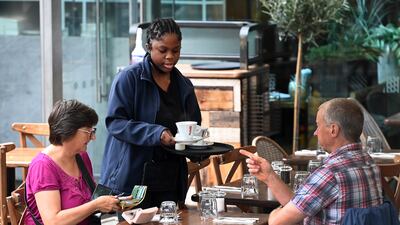Britain’s post-lockdown recovery suffered a sharp slowdown in August as business activity was hampered by staff shortages and supply chain challenges.
A flash reading of the IHS Markit/CIPS composite Purchasing Managers’ Index, considered a good gauge of economic health, dropped for the third month in a row.
It fell to 55.3 from 59.2 in July, its lowest level since February; however, a reading above 50 still signals growth over contraction.
Chris Williamson, chief business economist at IHS Markit, said the pace of growth was still slightly above the pre-pandemic average, but “there are clear signs of the recovery losing momentum in the third quarter after a buoyant second quarter”.
“Despite Covid-19 containment measures easing to the lowest since the pandemic began, rising virus case numbers are deterring many forms of spending, notably by consumers, and have hit growth via worsening staff and supply shortages,” he said.
Business owners have complained that self-isolation requirements for contacts of people with Covid-19 have made it hard to secure enough staff. But since August 13, owing to the so-called pingdemic, such employees need no longer isolate if they are fully immunised.
Supplier delays have risen to a level not seen since the start of the pandemic. The number of companies reporting a fall in output caused by staff or materials shortages is at its height.
“In manufacturing, sectors including automotive production and electrical goods have fallen into decline, due mainly to supply constraints,” Mr Williamson said.
Britain’s economy rebounded quickly when restrictions were first eased in March, having suffered its biggest fall in output in more than 300 years last year.
However, economists say the fall in the headline composite reading for three successive months is another sign that the recovery is slowing, because it comes in addition to last week’s “softer” inflation reading and retail sales figures.
While UK retail sales dropped 2.5 per cent in July after a 0.2 per cent gain in June, indicating a slowdown in the recovery, the country’s inflation rate slowed to 2 per cent last month.
“The chunky fall in the composite activity PMI suggests that the economy struggled to gain fresh momentum in August despite the apparent easing of the “pingdemic” and final relaxation of all domestic restrictions,” said Kieran Tompkins of Capital Economics.
The fall in UK output was mainly driven by services companies, which make up the bulk of Britain’s economy, with the services PMI reading dropping to 55.5 in August, down from 59.6 in July.
While the figure was still above the 50 mark – which separates growth from contraction – it signalled the weakest rate of expansion in six months as staff shortages constrained the sector’s recovery despite the country reopening.
“The soft services PMI reading will be particularly disappointing, given that the removal of final lockdown restrictions in July was expected to see the sector bounce back strongly,” said Stuart Cole, chief macroeconomist at stockbroker Equiti Capital.
On a brighter note, a measure of employment hit its height as furloughed workers return to their jobs and businesses were more optimistic about future output.
A gauge of input prices fell after hitting a more than 20-year high in July and the prices charged by factories moved further away from June’s record high.
The Bank of England is assessing whether a jump in inflation turns into more stubborn price growth, with the lender saying earlier this month it expected “modest monetary tightening” would be needed over its three-year forecast period.
“The UK data released over the past week offers nothing to suggest the BoE will be concerned about facing further pressure to dial back its ongoing level of support; rather acceptance is probably growing that no meaningful review of policy is likely now until a full assessment has been made of the strength of the economy following the removal of much of the government’s support programmes next month,” Mr Cole said.
Meanwhile, eurozone business activity remained strong this month, only dipping from July’s two-decade high pace, as a rapid vaccination drive allowed more businesses to reopen.
IHS Markit’s composite PMI fell to 59.5 in August from 60.2 last month as ongoing supply chain challenges prevented a faster expansion and fears new coronavirus variants may lead to renewed restrictions continued to dent optimism.
“The eurozone’s economic recovery retained impressive momentum in August, with the PMI dipping only slightly from July’s recent high to put its average in the third quarter so far at the highest for 21 years,” said Mr Williamson.
“Supply chain delays continue to wreak havoc, however, leaving companies frequently unable to meet demand and pushing firms’ costs higher.”
While a PMI covering the bloc’s dominant service industry nudged down to 59.7 from July’s 15-year high of 59.8, overall the economic zone was bolstered by a second month of job creation, which is now at its strongest in 21 years.
Looking ahead, Maddalena Martini, an economist at Oxford Economics, said the potential spread of more virulent virus variants and the prolongation of supply chain problems are the main risks to the eurozone’s economic recovery.
“The level of uncertainty around the forecast remains very high, but we still expect a strong recovery over the coming quarters,” she said.


